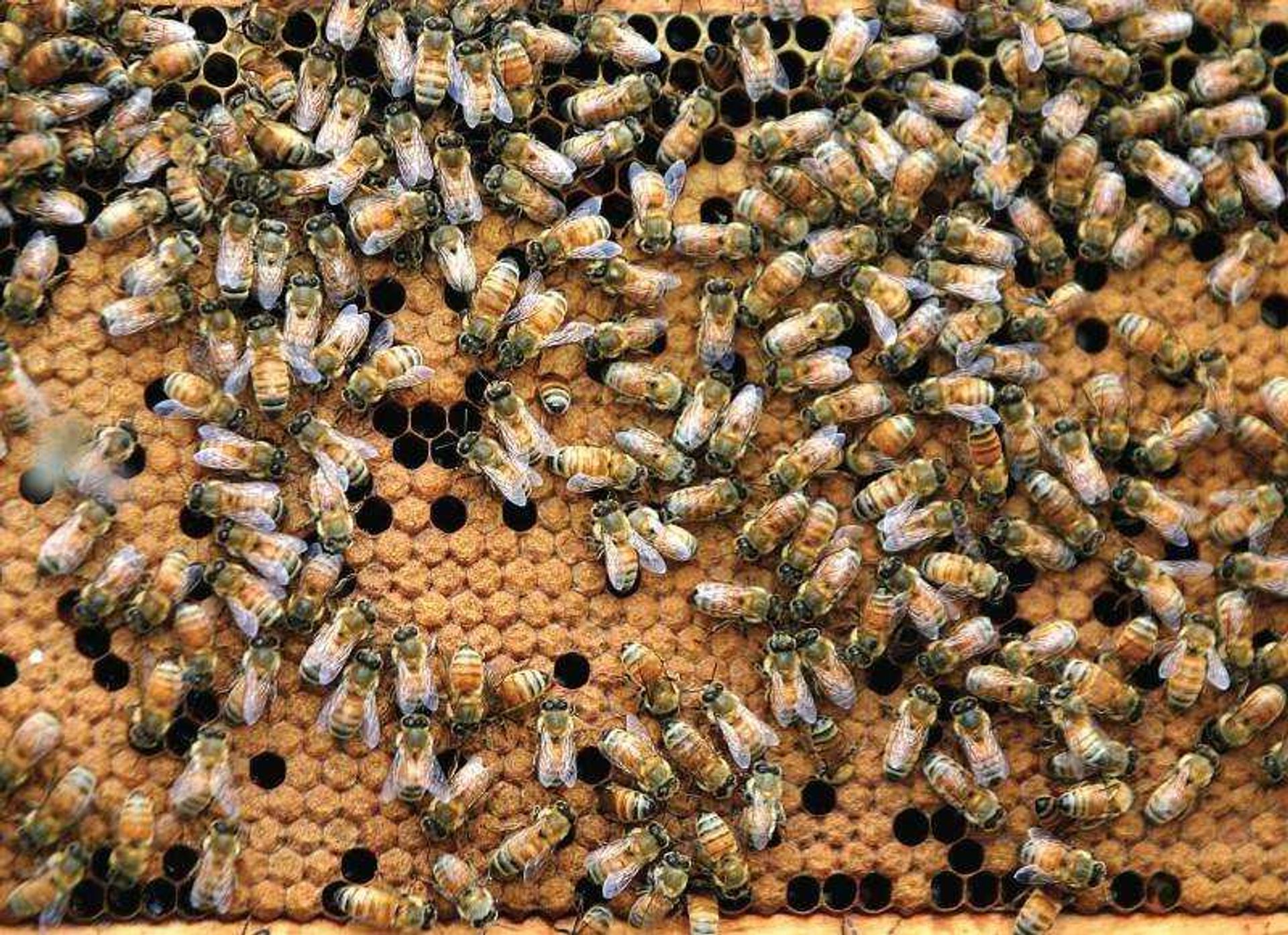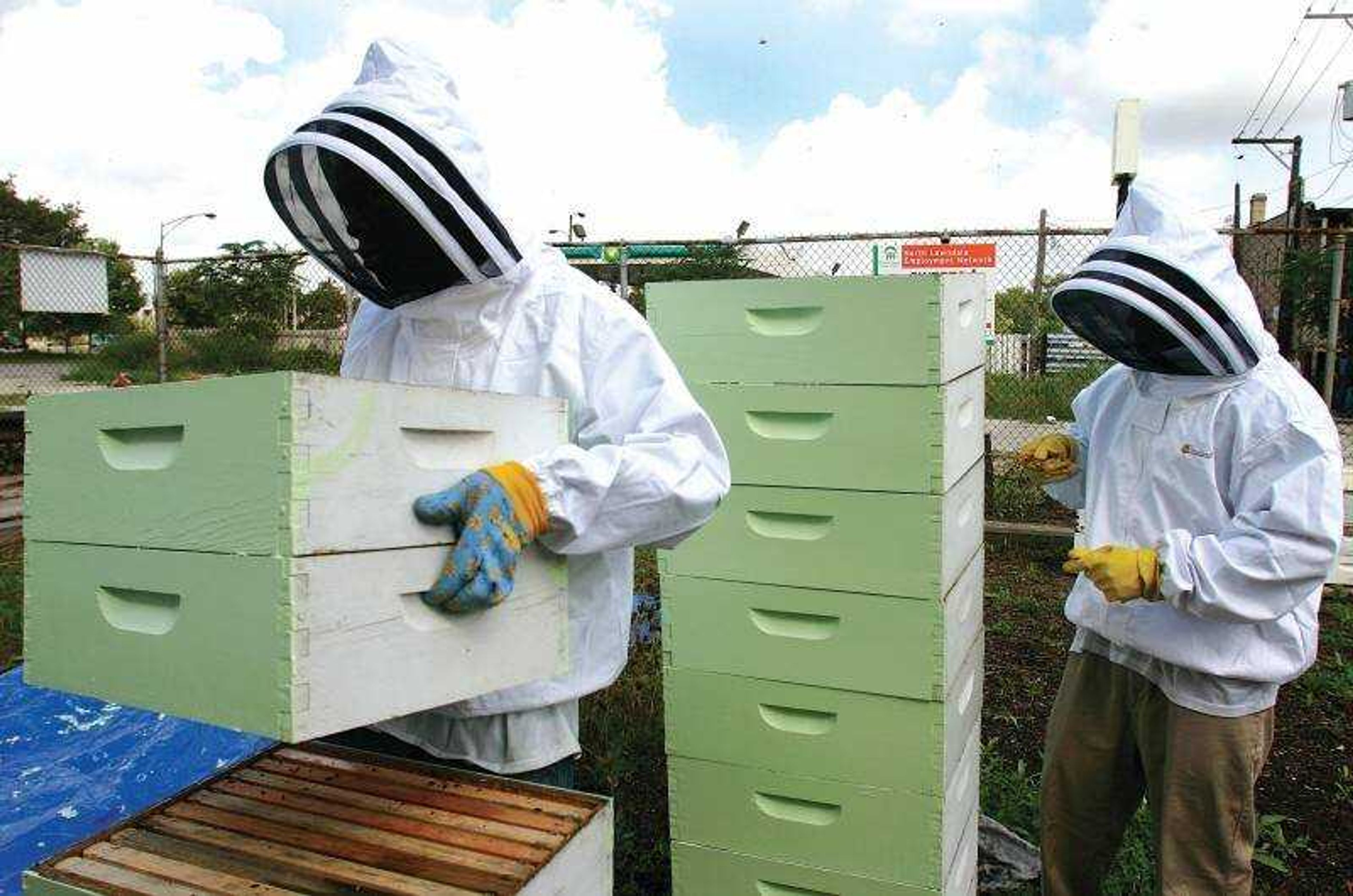Hope in the hives
CHICAGO -- Before heading into the yard to work, Tony Smith pulls over his head a white hooded jacket with stiff veiled netting that protects his face. He tugs yellow leather gloves beyond his wrists and makes sure his pants cover the tops of his tennis shoes...
~ Ex-cons get a chance at a new life -- as beekeepers
CHICAGO -- Before heading into the yard to work, Tony Smith pulls over his head a white hooded jacket with stiff veiled netting that protects his face. He tugs yellow leather gloves beyond his wrists and makes sure his pants cover the tops of his tennis shoes.
Not the kind of uniform most people wear to work and certainly nothing like the Illinois Department of Corrections garb the 30-year-old Smith wore nearly half his life.
Three months after he was paroled, Smith is a beekeeper.
With Sweet Beginnings, a program providing ex-convicts with work experience and the start of an employment history, Smith tends to hives and helps produce upscale beauty and consumer products from the honey.
Smith was nervous when he first considered the job. Now he talks of the importance of the tools of the trade -- he uses a smoker to calm the bees and carries a flat-bladed tool to pry the hives apart, in addition to wearing his beekeeper suit. Sporting tattoos on both forearms and diamond hoops in his ears, he said he can recognize when bees are "having a bad day."
"The program is a good experience, because you're learning respect. ... You have to get used to the bees' attitudes and adjust to their emotions," he said. "It's like dealing with people -- you have to learn to respect their space."
As unusual as the beekeeper program is the spot where the hives are -- a scrubby urban lot surrounded by a chain link fence. It has about as much dirt as grass and lies just blocks from an expressway. The 18 hives are grouped in a semicircle in the lot, and up to 35,000 bees make their homes there.
Sweet Beginnings is in the North Lawndale neighborhood, on the city's west side, a spot devastated by riots in the 1960s and the closing of large factories and businesses in 1970s, including International Harvester.
The area has long wrestled with poverty, unemployment, drugs and crime. The North Lawndale Employment Network -- the not-for-profit group behind Sweet Beginnings -- hopes to change that by providing local people with jobs and economic advancement.
The group's executive director, Brenda Palms Barber, realized that the neighborhood's high unemployment rate -- triple the Chicago average -- was directly linked to the effects of incarceration. Fifty-seven percent of the area's adults have been involved with the criminal justice system, according to a report commissioned by the group five years ago.
Ex-convicts can be hard to fit with jobs and so are often bypassed by social service agencies, Palms Barber says. By not finding them productive work, she said, "you only leave them to go back to their old habits."

A chance mention of a hobby
She first considered a delivery service but figured its target consumers, senior citizens, wouldn't want former inmates in their homes. Then she lunched with a friend who mentioned her husband's hobby, beekeeping.
Suddenly, Palms Barber had an "off the wall" project that met her criteria: It was inexpensive, could employ those with little education, and offered transferable skills -- in this case, landscaping, food processing and retail sales.
There was no shortage of vacant lots in North Lawndale. And she learned that honey produced in cities is valued for its flavor and texture, given that urban honeybees often have access to a wider variety of blossoms than their country cousins.
The first batch of honey, labeled Beeline, came out in 2004. It was a hit at farmers markets, and a high-end restaurant created a menu around it. The employment network generated $30,000 in sales, though organizers found it hard to make much money in honey. Employees are paid between $7 and $9 an hour.
So for the past two years, Sweet Beginnings has focused on creating and perfecting "value-added products" containing the honey from its hives. Also marketed under the Beeline brand, these include a body scrub, lip balm, lotion and candles.
That change in direction is something Palms Barber was advised to do by Jennifer Henderson, chairman of the board at Ben & Jerry's Homemade Inc., who has volunteered to help Sweet Beginnings.
Return on investment on honey is 12 percent, but for honey-based personal products, that return shoots up to 80 percent, Henderson said. The products are expected to be relaunched, with new packaging and formulations in January.
"We have to make sure the product is excellent, but also make sure the numbers work. And make sure the social mission happens and the story gets out and builds goodwill in the public -- creating a consumer base," Henderson said.
Those employed by Sweet Beginnings first go through a program called U-Turn Permitted, which offers them job readiness training, mentoring support and classes in such subjects as anger management.
Seventeen ex-convicts have completed the program since 2004. None has returned to prison.
This year's harvest is already under way, with each of the hives expected to produce about 65 to 70 pounds of honey.
On a recent warm day, three Sweet Beginnings workers were painting the hive boxes a pleasant light green color, an upgrade from their dull mix of gray, white and yellow.
Joining Tony Smith, who served time for home invasion and armed robbery, was Shelby Gallion, a 22-year-old fresh out of a nine-month prison stint on drug charges, and 49-year-old Gerald Whitehead. Out of prison now for nearly nine years, Whitehead had spent most of his adult life behind bars for everything from robbery to assault.
This day, the three moved among the hives, scattering the bees with smoke. They explained how they encourage sluggish hives with the addition of a queen bee and sugar water.
Whitehead used a flat-bladed tool to pry loose one of the hives' frames, exposing the butter-colored wax that sealed the honey.
He noted he's working in the same area where he once ran with gangs.
That led to prison, and when he got out his record as an ex-con made it hard to keep jobs. Also holding him back was his inability to read and write. He used to take his wife along on job interviews so she could fill out applications.
Now he's taking literacy classes and hopes to land a job working with his hands, such as plumbing or landscaping.
Noting he once didn't expect to live this long, Whitehead turns reflective.
"At one time, I'd see a bee and kill it. Now I've got love for bees," he said. "They got a language of their own, they know when to mate, they know when to feed each other, they know when to be aggressive. They know when someone's invading their territory, so they know how to defend themselves. They're sort of like people in the streets."
Connect with the Southeast Missourian Newsroom:
For corrections to this story or other insights for the editor, click here. To submit a letter to the editor, click here. To learn about the Southeast Missourian’s AI Policy, click here.






